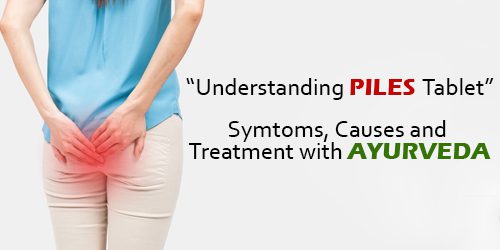Understanding piles tablet : Symptoms, Causes, and Treatment with Ayurvedic Medicine
Piles, also known as hemorrhoids, are a common health issue affecting millions of people worldwide. They are a type of swollen vein located in the lower rectum or anus, which can cause discomfort, pain, and bleeding. Piles can occur due to a variety of factors, including constipation, pregnancy, obesity, and a sedentary lifestyle. While they are not typically life-threatening, piles can significantly impact a person’s quality of life, making daily activities such as sitting, standing, and bowel movements uncomfortable and painful.
Fortunately, there are many treatment options available, including Ayurvedic piles tablets, which can alleviate symptoms and promote long-term healing. In this blog post, we’ll explore the symptoms, causes, and treatment options for piles with a specific focus on piles tablets. Whether you’re dealing with piles yourself or looking to learn more about this common health issue, this post will provide you with the information you need to make informed decisions about your health.
Symptoms of Piles

Piles, also known as hemorrhoids, can cause a range of uncomfortable symptoms that can significantly impact a person’s quality of life. Here are the most common symptoms of piles:
- Pain: Piles can cause pain in the anal region, which can range from a mild discomfort to a severe ache or burning sensation. Pain may worsen during bowel movements or when sitting for prolonged periods.
- Itching: Piles can cause persistent itching in the anal area, which can be very uncomfortable and irritating. Scratching can further aggravate the area and increase the risk of infection.
- Bleeding: Piles can cause bleeding during bowel movements or spontaneously. The blood may be bright red or dark, depending on the location of the piles. If bleeding is excessive, it may lead to anemia and require medical attention.
- Swelling: Piles can cause swelling and inflammation in the rectal area, which can make it difficult to sit or stand comfortably.
- Feeling of fullness: Piles can cause a feeling of fullness or discomfort in the rectal area, even after a bowel movement.
It’s important to note that the severity and frequency of these symptoms can vary depending on the type and stage of piles. For example, external piles may cause more pain and discomfort, while internal piles may cause more bleeding and itching.
The manifestation of symptoms related to piles can differ depending on the type and severity of the condition. Piles can be categorized into two main types: internal and external.
- Piles that develop within the rectum and are not externally visible are known as internal piles. They are typically painless but can cause bleeding during bowel movements. Other common symptoms of internal piles include itching, discomfort, and a feeling of fullness in the rectal area. In some cases, internal piles can prolapse, which means they protrude outside the anus. Prolapsed internal piles can cause more severe symptoms, including pain and discomfort.
- External piles, on the other hand, occur outside the anus and are visible. Internal piles can lead to discomfort, including pain, itching, and bleeding. External piles can also become thrombosed, which means a blood clot forms inside the pile. Thrombosed external piles can cause severe pain and require medical attention.
Causes of Piles
The primary causes of piles include constipation, obesity, and a sedentary lifestyle. When a person is constipated, they strain during bowel movements, which can put pressure on the veins in the rectal area and cause piles to develop. Similarly, obesity and a sedentary lifestyle can also increase the risk of piles by putting pressure on the veins in the rectal area.
However, there are also other factors that can contribute to the development of piles. Genetics may play a role in the development of piles, as some people may be predisposed to weak veins in the rectal area. Pregnancy can also increase the risk of piles, as the growing uterus can put pressure on the veins in the rectal area. Other factors that can contribute to the development of piles include aging, a poor diet, and chronic diarrhea.
Treatment of Piles with Ayurvedic Piles Tablet
When it comes to piles treatment, Ayurvedic piles tablet focuses on addressing the underlying imbalances that contribute to the condition, rather than just treating the symptoms. According to Ayurvedic principles, piles are caused by an imbalance in the body’s doshas, or energies. The three doshas in Ayurveda are Vata, Pitta, and Kapha, and an imbalance in any of these doshas can contribute to the development of piles.
piles tablet can address both the underlying causes of the condition as well as alleviate symptoms. In Ayurveda, piles are considered a result of an imbalance in the body’s doshas, or energies, and the best tablet for piles aims to restore balance and promote healing.
Here are some ways piles tablet can address the underlying causes of piles and alleviate symptoms:
- Improving digestion: Ayurveda places great emphasis on the role of digestion in overall health. Poor digestion can lead to constipation, which is a major cause of piles. best tablet for piles includes herbs and remedies that can improve digestion and regulate bowel movements.
- Reducing inflammation: Inflammation is a major cause of pain and discomfort in piles. piles tablet, such as Kutaj and Neem, have anti-inflammatory properties that can help reduce inflammation and pain associated with piles.
- Promoting healthy circulation: Good circulation is essential for maintaining healthy bowel movements and preventing the development of piles.
Ayurvedic piles tablet focuses on addressing the underlying causes of the condition, as well as alleviating symptoms. By improving digestion, reducing inflammation, and promoting healthy circulation. The best tablet for piles can provide an effective, natural way to manage piles and improve overall health and wellbeing.
How Ayurvedic Practices Can Promote Digestive Health And Reduce The Risk Of Piles
Ayurvedic tablets for piles can promote digestive health and reduce the risk of piles by improving the functioning of the digestive system. Ayurveda considers digestion to be the foundation of good health and believes that a healthy digestive system is essential for overall well being.
Here are some ways Ayurvedic piles tablet can promote digestive health and reduce the risk of piles:
- Dietary changes: Ayurveda emphasizes the importance of a balanced diet in promoting digestive health. A diet rich in fiber, whole grains, fruits, and vegetables can help regulate bowel movements and prevent constipation, a major risk factor for piles. Ayurveda also recommends avoiding processed foods, spicy and fried foods, and alcohol, which can irritate the digestive system and increase the risk of piles.
- Hydration: Adequate hydration is essential for maintaining healthy bowel movements and preventing constipation. Ayurveda recommends drinking warm water throughout the day to aid digestion and promote healthy bowel movements.
- Ayurvedic herbs: piles tablet contain natural compounds that can help regulate bowel movements, reduce inflammation, and promote healthy circulation in the digestive system.
- Yoga and meditation: Ayurveda recommends yoga and meditation as a way to reduce stress, which can impact digestion and increase the risk of piles.
Recommended Piles Tablet :
Piles tablets are formulated using natural ingredients and traditional Ayurvedic principles to help alleviate the symptoms of piles and promote overall digestive health.








